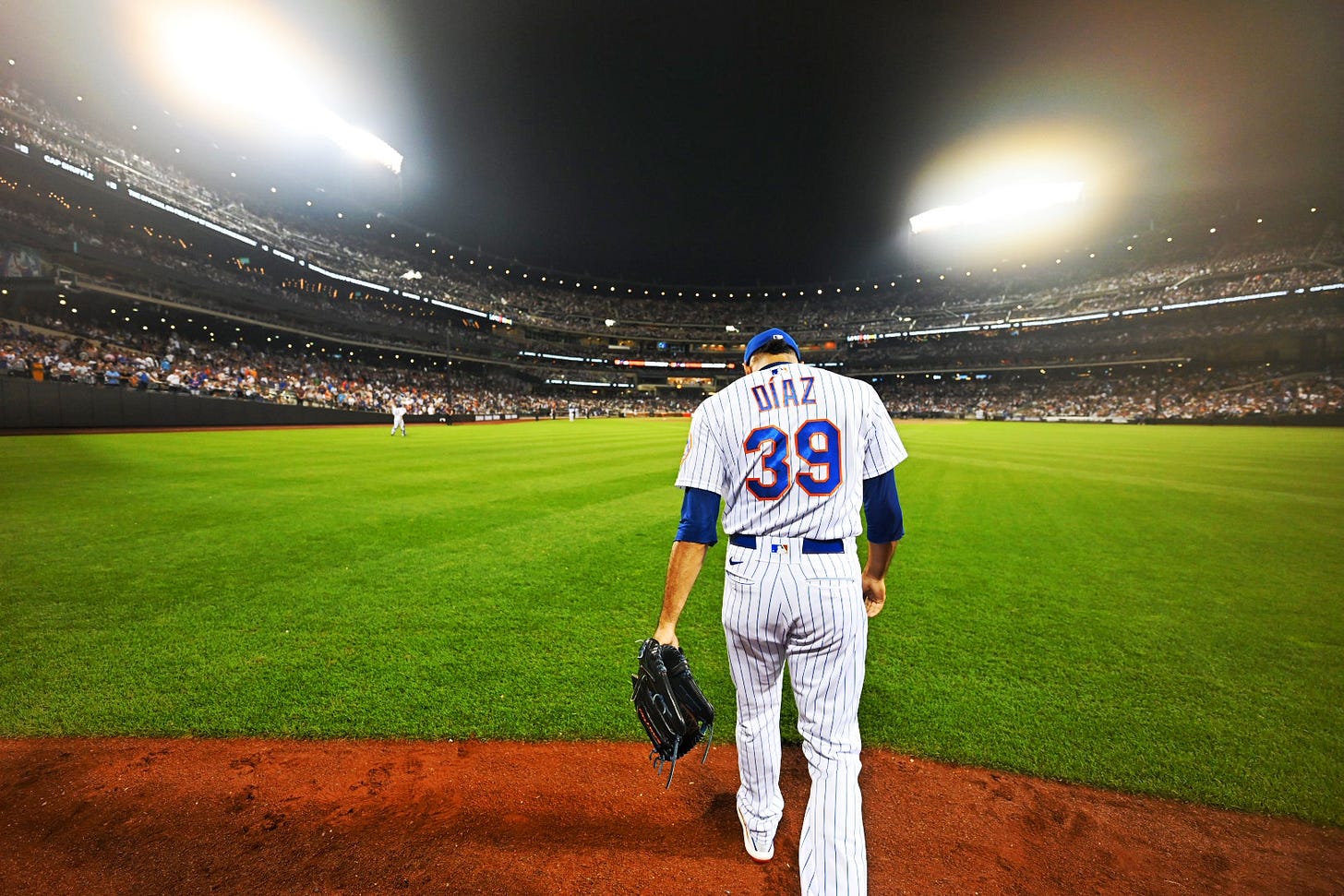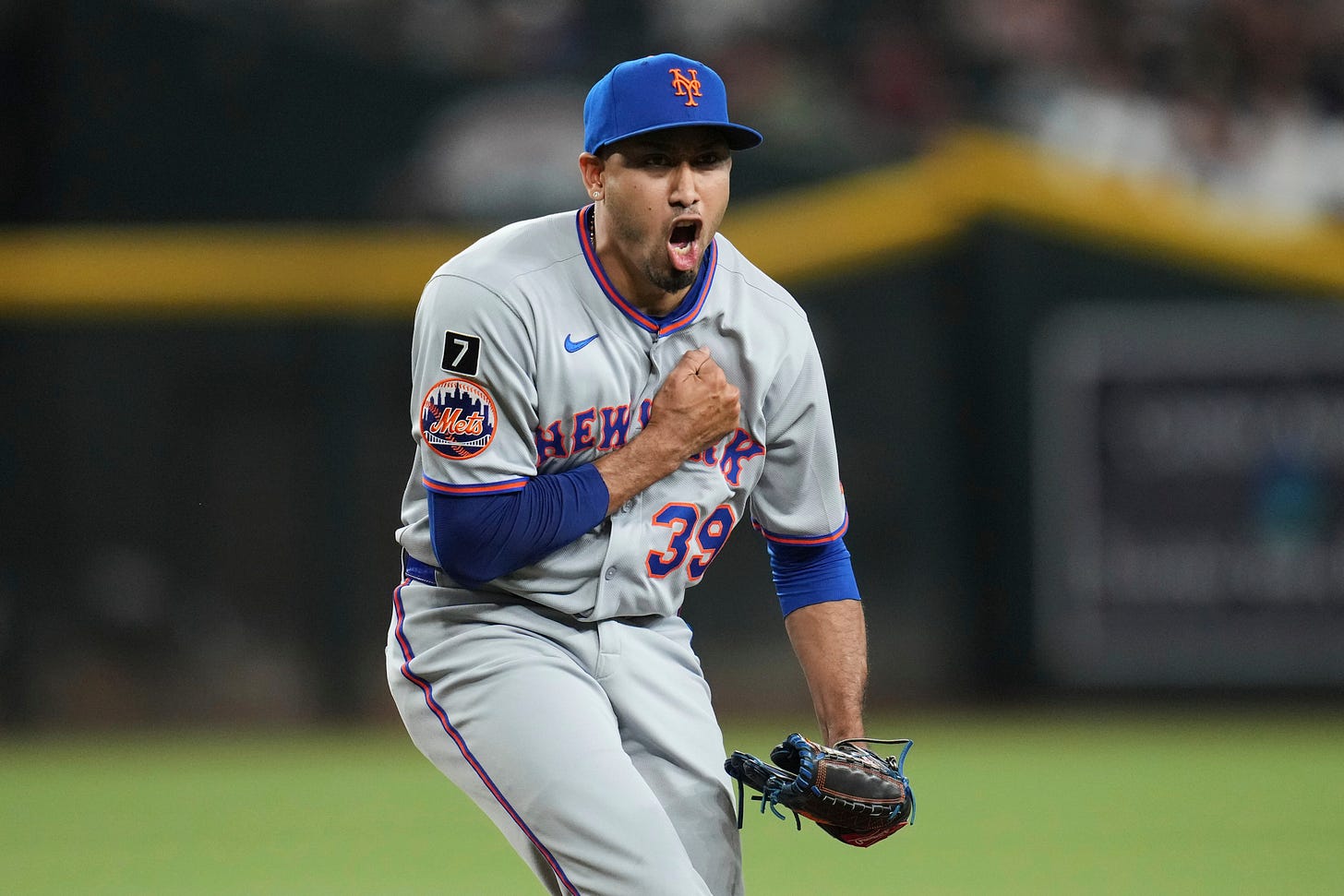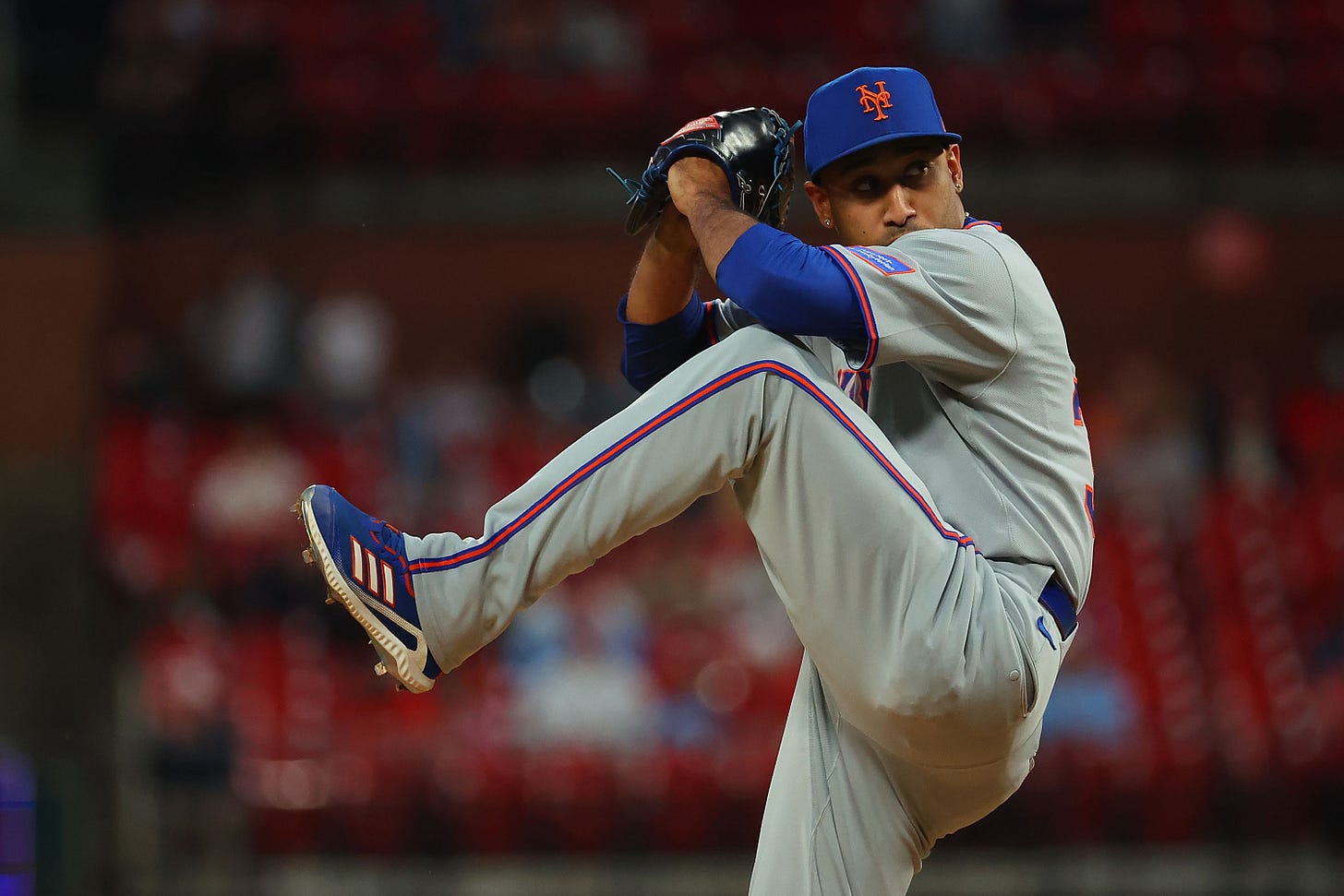What to do with Edwin Díaz?
Edwin Díaz can opt out of his contract after the World Series, but if he opts in, he is opting in for 2026 and 2027
In addition to Pete Alonso, which I discussed on Friday, the Mets have another star player who can opt out of his contract after the World Series.
That player is Edwin Díaz, who signed a five-year, $102 million contract before the 2023 season with a club option for $17.25 million in 2028. But he has player options for the 2026 and 2027 seasons, which all must be triggered or declined at once after the 2025 season. In short, if he opts in, he is opting in for at least two more seasons at $18.25 million per, and then the Mets would have control of him for 2028 at $17.25 million.
He said at the conclusion of the last game of the year he hadn’t decided if he was going to opt out of his contract. But all signs point to Díaz opting out and seeking more years at a minimum, if not a modest raise in his average annual salary. He took a $12 million signing bonus before the 2023 season, earned $17.25 million in each of 2023 and 2024, and earned $17.5 million in 2025.
After a shaky return in 2024 following patellar tendon reconstructive surgery in 2023 (which wasn’t at all surprising), Díaz demonstrated once again that he is among the best closers in baseball in 2025, posting a 1.63 ERA over 62 appearances with 28 saves, 98 strikeouts against 21 walks in 66.1 IP. The 2.0 fWAR he posted this past season was the third-best mark of his career, and he posted a career-best 48.4 percent ground ball rate and 0.54 home runs per nine innings. His 2.0 fWAR in 2025 was the ninth-best mark in baseball among qualified relievers, and his 1.63 ERA was the second-best mark in baseball and the best in the National League among qualified relievers as well.
Obviously, Díaz was the best reliever the Mets had this year, as he has been throughout his tenure with the club over the last six seasons, despite a lost 2023 season and some bumps in the road along the way. His 144 saves with the Mets are the fifth-highest mark in the majors since 2019 behind only Emmanuel Clase (182), Raisel Iglesias (189), Kenley Jansen (208), and Josh Hader (215).
If Díaz doesn’t opt out, this point is moot. But there’s no reason to believe Díaz won’t opt out and enter free agency this winter until he doesn’t.
So the question is, should the Mets try to retain Díaz if he opts out?
There’s no question the Mets are better with Díaz than without him right now. Again, he is among the best closers in the game, he’s a known quantity, and replacing him among the other options in free agency would be next to impossible on paper. That doesn’t mean the Mets couldn’t take a less expensive flyer on another option. Devin Williams, Ryan Helsley, Pete Fairbanks, Raisel Iglesias, Kyle Finnegan, and Kenley Jansen headline the closers market as alternatives for the Mets, but nobody’s stock is higher in the closers market than Díaz’s.
Díaz will be entering his age-32 season and, if he opts out, he will be leaving $38 million in guaranteed money over the next two years on the table. Per the terms of his contract, opting in would mean he is opting in not just for 2026, but for 2027 as well. There is a $17.25 club option ahead of his age-34 season in 2028 with a $1 million buyout for a total of $54.25 million in potential earnings over the next three seasons. So, opting out isn’t an unreasonable gamble for him to take in an effort to get more guaranteed years in a new deal, which would be the main point in doing so. There’s no reason to believe he won’t seek another 4-5 year deal at $18-20+ million per season, and attempt to establish a new high bar in average annual salary among closers.
And as I always say about the Mets these days, money is no object. But that doesn’t mean the Mets should carve out more money for a closer who is unquestionably aging at this point in his career. As they proved in 2025, it doesn’t matter how much money a team spends as much as it’s how they spend it, and clearly, their $340 million wasn’t entirely money well spent, and that’s being nice.
Now, there’s no question the Mets should try to retain Díaz. Steve Cohen is trying to establish this club as a destination for the best players in the game, and Juan Soto is a testament to that effort. But there has to be a sensible limit on how far the Mets are willing to go in years on a deal for Díaz, and the baseball sense for the Mets may not necessarily align with what Díaz is looking for.
Remember, the shelf life of a closer is normally not more than a few years. Aroldis Chapman, Trevor Hoffman, John Franco, Mariano Rivera, and maybe a few others are exceptions to the norm. The Mets have gotten three elite seasons from Díaz in the six he’s been here, although I know some will tell me he had bad luck in 2019, who knows what he would’ve been in 2023, and what he would’ve been in 2024 if he hadn’t gotten hurt.
So, if the Mets give Díaz another five years and $100 million at age 32 to close games, suffice it to say the back end of that deal might not be pretty. He may not even be closing by the end of it, to be perfectly honest.
But as is the case with Alonso, there’s a history here with Díaz, and he has of course been more great than even mediocre over the course of his tenure with the Mets. He has 144 saves with the Mets since 2019, so he would probably need five years at and 25-30 saves a piece on average to set the franchise mark and overtake Franco, who holds the franchise mark with 276 saves. It’s not unreasonable to think he can do it if he stays, and that historical value to the franchise has merit, for sure.
Of course, the baseball value will always outweigh the sentimental value for a player. This matters, but not enough to assume an unreasonable amount of risk. And again, Díaz’s primary objective by opting out would be to guarantee more years in all probability, with any significant raise in his average annual salary serving as icing on the cake.
In the end, this is a tough call if Díaz opts out and asks for a long deal (which, he will, otherwise why opt out?). The Mets would be better in the short and medium-term with Díaz. Nobody can dispute that. If the Mets want to go for a championship in 2026 and 2027, it’s hard to see them doing it without Díaz. If they feel they can do it though, then they might need to assume that risk on the back-end of a deal.
After all, risk is a part of the game.






Both Alonso and Diaz have Stearns/Cohen over a barrel because of the lack of alternatives. They'll just have to pay up. And gotta load up the wheelbarrow for Bellinger. Next wheelbarrow for starting pitching. Uncle Steve, it'll be an expensive winter. You'll be 70 next June and you can't take it with you. Go for it!
Ever since Pete Alonso hit THAT homer off of Devin Williams, Williams has not been the same. HARD pass.